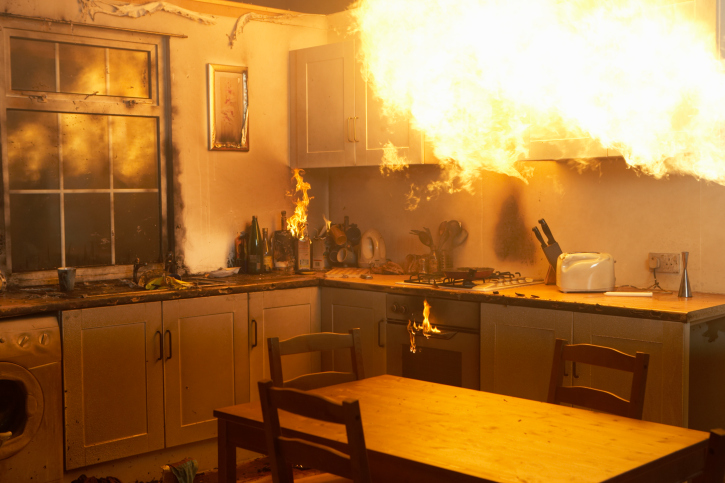Safety Tips: 5 Ways to Prepare for a House Fire – and What to Do if One Breaks Out
 House fires can break out for a wide range of reasons, and these include everything from grease fires while cooking in the kitchen to lightning striking the home. They can cause a significant amount of property damage as well as personal injury or even loss of life, so preventing them and knowing how to properly respond if a fire does break out are important. Whether buying a new home or residing in an existing home, everyone can benefit from learning more about fire safety rules.
House fires can break out for a wide range of reasons, and these include everything from grease fires while cooking in the kitchen to lightning striking the home. They can cause a significant amount of property damage as well as personal injury or even loss of life, so preventing them and knowing how to properly respond if a fire does break out are important. Whether buying a new home or residing in an existing home, everyone can benefit from learning more about fire safety rules.
Have An Exit Strategy
Fires can break out whether residents are awake in the living room or kitchen, taking a bath or sleeping in the bedrooms. It is important to have a fire exit strategy for every floor of the home and every room of the home. In addition, it is equally important that all residents in the home understand the strategies and know how to get out.
Invest In Fire Safety Ladders
Fire safety ladders are designed to give residents a safe escape route from second story windows, and they should be placed in a convenient location in every second floor room in the home. Residents should know how to attach them securely to the window as well as how to get down the ladder safely.
Purchase A Fire Extinguisher
Generally, it is safer for residents to get out of the home in the event of a fire rather than to attempt to put the fire out, and personal safety should also come before thoughts about saving the property. However, in the event a very small fire has broken out, a fire extinguisher can provide a homeowner with a safe way to put the fire out. It is best to keep a fire extinguisher in a convenient location on each floor of the home.
Place Fire Detectors In Strategic Locations
There are codes regarding the placement of fire detectors in a home, be sure you arefamiliar with and are in compliance with these standards. In many cases, homeowners may benefit from having additional fire detectors placed in strategic locations throughout the home in addition to the locations required by code.
Check Fire Safety Equipment Regularly
Fire safety and prevention equipment is only useful if it works, so it is important to test the equipment and supplies regularly. For example, a homeowner may test the batteries in a fire detector monthly and may take extinguishers to the local fire department for testing annually. These steps will help to ensure that residents have access to functional safety equipment regularly.
Residents should also know what to do if a fire breaks out in a home, and in most cases, the answer is to get out of the home quickly and to call the fire department. Attempts to save personal belongings should not be made, and all residents should know where the family will meet outside of the home in the event of a fire.

 Selecting the right home to purchase for a family is a monumental task, and this process can seem even more challenging for those with a large or growing family. A common goal may be to give everyone ample space to stretch out and feel relaxed, but some home buyers may also be focused on other factors like location, cost and even the general style of the home. While choosing the perfect home for a large or growing family is not easy, the process can be simplified by focusing on a few points.
Selecting the right home to purchase for a family is a monumental task, and this process can seem even more challenging for those with a large or growing family. A common goal may be to give everyone ample space to stretch out and feel relaxed, but some home buyers may also be focused on other factors like location, cost and even the general style of the home. While choosing the perfect home for a large or growing family is not easy, the process can be simplified by focusing on a few points. Many home buyers who are applying for their first mortgage will go to great lengths to research the options, learn more about loan terms and generally educate themselves about a process that they are unfamiliar with. Despite these common steps that rookie mortgage applicants make, they often make similar mistakes when applying for their first mortgage. By learning about these common mistakes, you can take steps to prevent making them yourself.
Many home buyers who are applying for their first mortgage will go to great lengths to research the options, learn more about loan terms and generally educate themselves about a process that they are unfamiliar with. Despite these common steps that rookie mortgage applicants make, they often make similar mistakes when applying for their first mortgage. By learning about these common mistakes, you can take steps to prevent making them yourself.